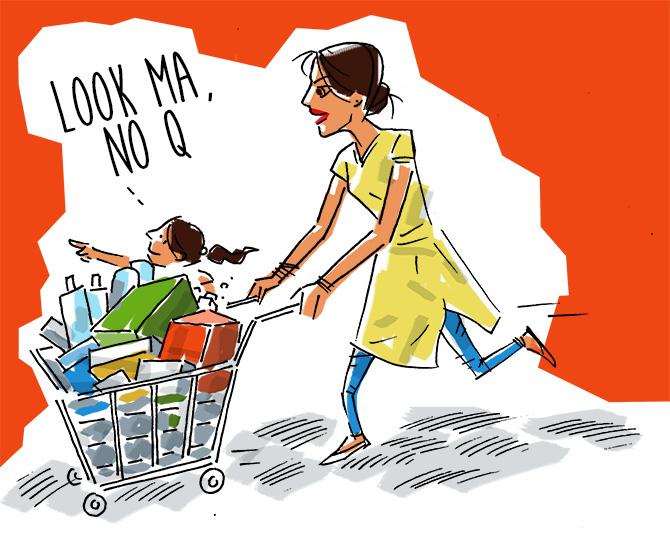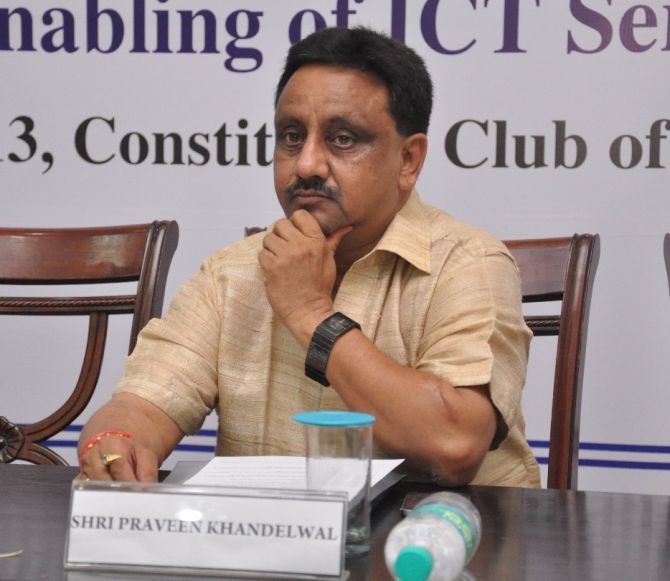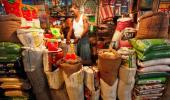'We were expecting a dessert after a meal, but we didn't get it.'
Illustration: Dominic Xavier/Rediff.com

The Confederation of All India Traders issued a statement soon after Diwali that consumers stayed away from festival shopping this year much to the disappointment of the trading community.
"In the last 4, 5 years, ever since online companies started online shopping in a big way with heavy discounts, our sales are affected badly. As there is no control over the way the online companies operate, they were able to destroy the domestic retail market to a great extent," Praveen Khandelwal, secretary-general, CAIT, tells Rediff.com's Shobha Warrier.
Why are consumers staying away from festival shopping? Is it because the economy is sluggish, or because more and more people are shopping online?
The first reason is people are short of cash in their pockets because of the sluggish economy.
Their money has been stuck in two areas -- in real estate and gold.
They have not been able to convert this into liquid cash as in the last 2-3 years, the real estate sector has not been doing good.
So, they have not been able to shop to their heart's content during the festive season.
The second reason is the influx of online companies and repeated discount sales by them.
These companies are offering lower prices, much lower than the original cost by indulging in deep discounting and low funding predatory pricing and this has affected the markets.
So, there is no level playing field in the market where the offline players are not able to compete with them.
I would say, these two are the main reasons why consumers have stayed away from festival shopping which has resulted in very slow sales.
How are offline traders going to tackle online sales? Today, people are shopping from vegetables and fruits to televisions and fridges online.
We are contemplating to have a discussion with the government to start a reliable online portal where our offline retailers also can do e-commerce in a trustworthy and transparent manner.
Soon after Diwali, we will talk to Union Commerce Minister Suresh Prabhu and also draw the prime minister's attention to this so that the government can open an online portal with CAIT where Indian retailers can offer goods.
Only this way we can compete with these multinational online players.
We have been requesting the government time and again to formulate an e-commerce policy and formation of a regulatory authority on e-commerce to monitor the e-commerce business in India.
Do you feel there is no control over how online players treat consumers?
Absolutely. There is no regulatory authority, no e-commerce policy and in the absence of which it has become an online playground for these online companies where they set their own rules.
Recently, a study found that 20% of the items sold online are fake. Do you feel consumers will go back to shopping in stores because of this?
Because the lifestyle of Indians has changed completely, people do not have time to go shopping.
In a way, you can say consumers are forced to go online shopping.
So, the reality is going to be more online shopping.
That's why we want a more transparent and reliable online portal from where consumers can buy things confidently and without the fear of getting cheated.
Are small traders going through a crisis now because of a bad festival season?
I will not say there is a crisis.
We were expecting a dessert after a meal, but we didn't get it.
In India, from Navratri onwards, it is festival season and this will extend up to February-March, and this is the time people do maximum shopping.
Traders survive the rest of the year based on the sales during the festival season.
But in the last 4, 5 years, ever since online companies started online shopping in a big way with heavy discounts, our sales are affected badly.
As there is no control over the way the online companies operate, they were able to destroy the domestic retail market to a great extent.
Even when they deliver fake materials and cheat consumers, nobody is there to question them.
So, there is an urgent need to have a comprehensive introspection of the entire retail trade in the country. Suitable measures have to be adopted to bring radical changes in the larger interests of the economy, the consumers and domestic trade.
Is this confined only to India, or is it there in the other markets like Europe, US, etc?
These online companies are in the habit of using predatory pricing, deep discounting and low funding all over the globe.
India being a new online market and the largest populated country, also known as the largest consumer market in the world, these tactics are affecting the Indian market significantly.
We are worried because the offline trade is entirely dependent on the consumers visiting stores.
If the consumer is addicted to online shopping and if s/he is cheated, there is a question mark on the credibility of online players.
How much has online shopping affected offline traders in India?
This year, there is a decline of around 40% in offline sales because of online players.
In the last one month itself, they have organised many sales with huge discount.
The sales were mainly in the FMCG, consumer durables and electronics and because of predatory pricing, they could offer huge discounts.
Is it confined only to the urban market? It is said there is buoyancy in the rural market after a good monsoon.
Today, there is no difference between the urban and the rural market.
Two, three years ago, there was a difference between these two markets, but now, it is a country-wide phenomenon.
Today, the rural area is also inching towards more and more online shopping.
In fact, we see a craze in rural areas to shop online as online shopping is a new experience for the rural market.

Till last year, Chinese products used to flood Indian market during the festival season. But it is reported that this year, there is a decline of 50%. What could be the reason for this?
The main reason for this decline is, for the last 2-3 years we at CAIT have been campaigning against Chinese products and asking people to boycott them.
We had organised around 300 workshops across the country to educate the traders not to buy Chinese products and the results are showing now.
Those who were importing from China tell us that demand from traders has come down by 50% this year.
That is why Chinese goods are not very visible in the market compared to the situation earlier.
Do you feel low-quality cheap products from China must have forced consumers also go for quality products?
Since price is a big consideration for the consumers in India, and since the Chinese products were available at a lower price, they chose Chinese products over Indian ones.
But after using them for some time, they have realised that they may be cheap but of low quality.
So, they are forced to throw away these products in a short period. Today, consumers are reverting to quality products mostly made in India.
Do you feel Indian consumers and the retail market as a whole are going through a learning process now?
I would say the Indian retail market is in a transformational stage.
The changes in the global market are affecting the Indian market as well.
As we are in a transformational change, there has to be a national level campaign to educate and make the community about the changes and there is also a need for upgradation and modernisation of the existing retail business.
We have to do this to compete with not only within the country but globally too.
Do you expect the Indian economy to pick up any time soon?
Though we have not started seeing any change in the Indian economy, we feel the time has come for a change. I feel very soon, it is going to change and change for the better.
I think within a year, we will start seeing a change happening particularly in the FMCG, mobile, electronics and the consumer goods market.
This will result in buoyancy in the Indian market.











 © 2025
© 2025